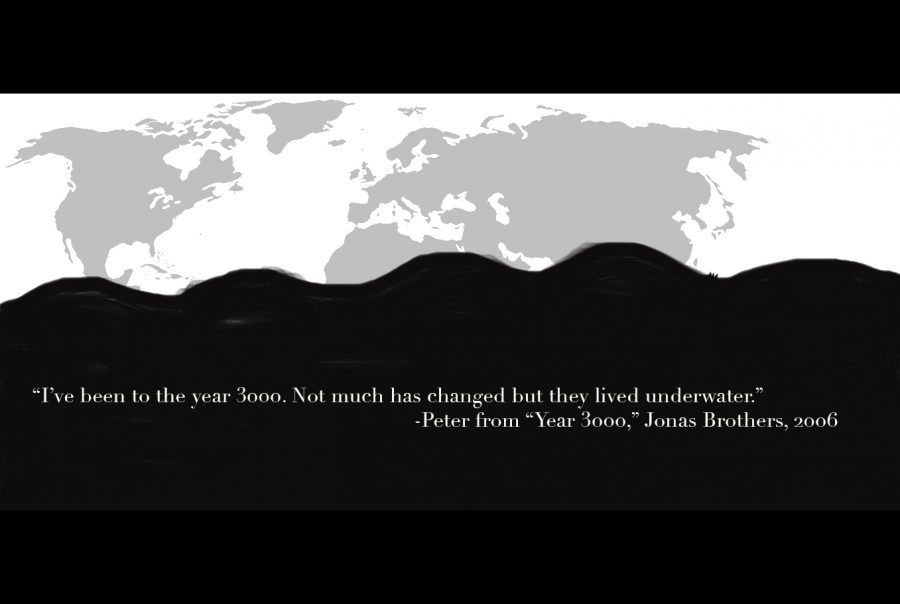Arctic Melt and Sea Level Rise: Wake-Up Call for Gen Z
Scientists around the world are finally coming to the realization that the Jonas Brothers were right in 2006 when they sang, “I’ve been to the year 3000. Not much has changed but they lived underwater.”
The consensus among several reputable international institutions — the U.S. National Oceanic and Atmospheric Administration, NASA, and the U.N. Intergovernmental Panel on Climate Change — is that sea-levels are rising at an alarming rate, and may eventually result in the partial submersion of continents as we know them today. Several coastal and island cities — both within the U.S. and around the world — are already sinking due to rapidly-melting ice and the consequent rise in sea level.
One wonders, then, why the U.S. administration continues to remain silent regarding the Paris Agreement and the Green New Deal when the country’s coastal and island regions are already experiencing the effects of rising sea levels. For example, flash floods in coastal parts of Texas and Louisiana have become increasingly frequent, in addition to cities in New Jersey and South Carolina joining the list of areas at risk for being underwater in the near future.
Why would a country as “liberal” as Canada — with a large number of global climate strikers — be set to add a 25 percent investment in new crude oil supply in tandem with Brazil? Or why does the European Union have a growing demand for wood pellets — a “renewable” source of energy that engages in mass deforestation from top providers U.S., Canada, and Russia — when various European cities face tangible and urgent flood risks?
While these countries face immediate risk and potential disaster as a result of climate change, they also are afforded opportunities created by melting polar caps, particularly access to unprecedented trade routes. Trips from Asian to Western countries have reported travel times reduced by 10 to 15 days, or 13,000 miles, saving billions of dollars in travel costs and icebreaking equipment previously required to attempt this new route, often referred to as the Russian Arctic route.
Not only is this region a game changer for trade, but it is also home to untapped vistas of fuel, minerals, and other non-renewable natural resources that have the world’s major players salivating. Concerningly, these nations seem to be ignoring — if not accepting — formidable environmental consequences, including damage to marine life, coastline deterioration, and rising sea levels. Furthermore, several national media outlets have mentioned that the Russian Arctic route runs the risk of conflict similar to that of the South China Sea — yet another economically strategic water body historically rife with overexploitation and intergovernmental discord.
Even more terrifying is that the Russian Arctic route is just the start. Global leaders have demonstrated interest in Greenland, another ice-covered haven of untapped resources. The Trump administration, in particular, has demonstrated a peculiar interest in purchasing the island. These reports are a clear indication that world leaders are more interested in economic benefit regardless of the repercussions, and are encouraging Arctic melt, rather than preventing it. Despite the knowledge that their own citizens already are or eventually will suffer from sea-level rise and other equally serious consequences, our leaders seem to be approving the suffering of millions of people as collateral damage for their countries to be deemed economic superpowers.
However, this article isn’t intended to turn Oberlin’s environmentalists and other concerned folks into dejected cynics. This is a global call out to my generation. While we have admirably spent a significant amount of time and effort using our votes and our voices to protect our environment and, by extension, ourselves, it is also now time to use our education and our dollars. It is time to join and create research teams, reject false solutions, and put our money where our mouth is. As you read this, researchers around the world are already looking to find solutions ranging from environmental engineering to sociopolitical solutions fit for this enormous, interdisciplinary issue.
Initiatives such as the International Maritime Organization’s consideration to place similar protections on Arctic ice as exist for Antarctic ice require Obies and others like us to make sure such work is done with adequate community involvement. My generation, particularly those with the privilege of receiving a liberal arts education, have a unique understanding of complex, intertwined issues and have the wherewithal to tackle them simultaneously. We must join global efforts to create knowledge and implement creative solutions to our environmental problems — thus creating a green economy built on fixing and sustaining what is left — rather than support self-serving companies and governments that have brought us to this state of emergency. Our minds, and the way we use our money, are the next steps to dismantling such power-hungry institutions.








